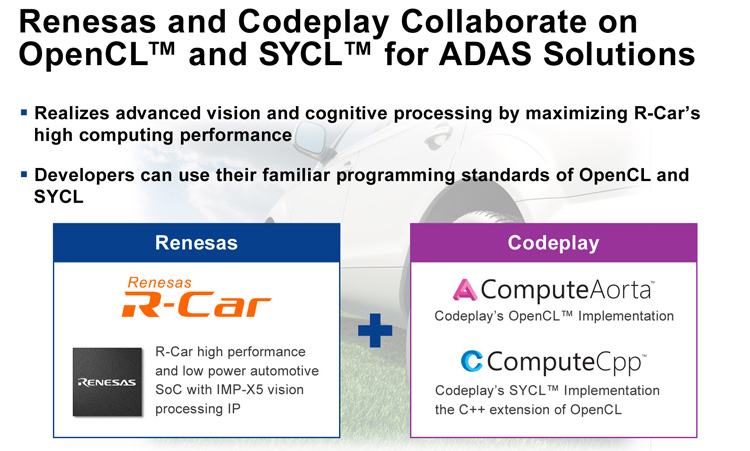Collaboration on automotive software provides ADAS solutions
It has been announced that Renesas Electronics and Codeplay Software are collaborating to deliver ComputeAorta, Codeplay’s OpenCL open standard-based software framework for Renesas R-Car system-on-chips (SoCs). The framework will be available first on R-Car H3 as a proof of concept, then focusing on R-Car V3M and other R-Car SoCs of the Renesas autonomy Platform for advanced driving assistance system (ADAS) and automated driving.
The new framework is designed to support software development for the R-Car’s latest image recognition IP, the IMP-X5, a multi-threading core optimised for computer vision and cognitive processing. Codeplay will also provide R-Car with ComputeCpp, an implementation of the SYCL open standard, enabling single source C++ software for high level and object-oriented programming.
The result of this collaboration provides developers with standard software development tools and support for a wide range of open source computer vision or open source deep learning software, such as TensorFlow library.
Developers will be able to focus on innovation, while benefiting from the high performance and low-power benefits of the R-Car SoCs. They can reuse their initial software assets or take advantage of the latest innovations in computer vision and cognitive processing, minimise porting effort and accelerate time-to-market.
Codeplay and Renesas will be running OpenCL computer vision demonstrations on R-Car H3 SoC at AutoSens 2017, which will be held in Brussels, Belgium, from September 19-21, at Codeplay booth #28.
“Computing performance is an essential factor in enabling highly-advanced computing platforms for autonomous cars” said Jean-Francois Chouteau, Vice President of Renesas Global ADAS Centre.
Chouteau continued: “Renesas’ exclusive IMP-X5 computer vision IP plays a key role within the R-Car SoCs to deliver these advanced features and enhance safety. Giving access to Renesas’ computer vison hardware with OpenCL and SYCL through collaboration with Codeplay will enable our customers to accelerate time-to-market while achieving an outstanding performance benefit in their ADAS designs. This demonstrates the value of our ‘Renesas autonomy’ platform for ADAS and automated driving.”
“OpenCL is a widely adopted open standard providing an efficient framework to support heterogeneous computing platforms,” said Andrew Richards, CEO, Codeplay. “Our ComputeAorta and ComputeCpp platforms will enable advanced vision and deep learning developers to use the familiar programming standards of OpenCL and SYCL and quickly benefit from R-Car’s advanced IMP-X5 computer vision IP.”

Key features of the ComputeAorta and ComputeCpp software frameworks for R-Car
- High computing performance from multi-threading frameworks: The ComputeAorta framework provides an OpenCL hardware abstraction layer that enables Tier1s and OEMs to take advantage of the full computing performance from Renesas R-Car SoCs, especially IMP-X5 computer vision IP. ComputeCpp extends OpenCL with a SYCL open standard implementation providing an efficient programming environment for multithread execution on heterogeneous cores. By using these frameworks, users can take full benefit of IMP-X5 computing performance from tailored multi-thread processing.
- Faster time-to-market by reducing development efforts: OpenCL and SYCL support enables developers to use C/C++ standard programming language helping them easily reuse their software assets, and work using a familiar development environment, without additional efforts to learn hardware detail
- Leverage Open-source ecosystem frameworks: Developers and system manufacturers can now benefit from OpenCL and SYCL support with a wide support community for a range of open-source computer-vision and cognitive processing software accelerating development of complex AI applications.



